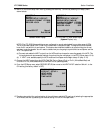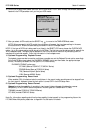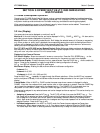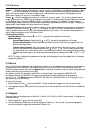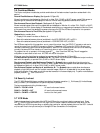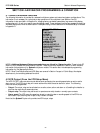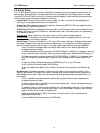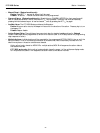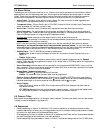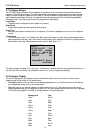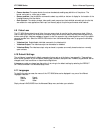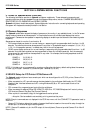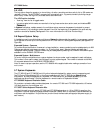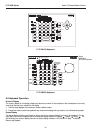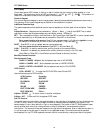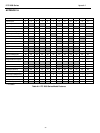
23
LTC 2600 Series Section 4 Advanced Programming
4.4 Alarm Setup
Depending on your multiplexer model, up to 9 or 16 alarm inputs can be connected to the multiplexer and are
associated with their corresponding video input. Alarm inputs can be configured as normally open or normally
closed. These inputs correspond to the camera inputs so that when an alarm input is initiated, the respective
camera picture is displayed or recorded. (Figures in Section 2 illustrate the Alarm In/Out connections.)
• Alarm Dwell: The alarm will be held for monitor display (Full video on monitor B, when applicable) and
recording for the programmed duration (3 to 60 seconds).
• Transparent Alarm: If Alarm Dwell is set to FOLLOWS, Alarms will follow the alarm input.These alarms
cannot be cleared until the Alarm contact is reset.
• Alarm Lists: The alarm record list defines which cameras are recorded when there is an alarm.
• Alarm Recording: On receiving alarms, the multiplexer will adjust the Record List to record cameras in
alarm at a higher rate. Cameras in alarm can be recorded Exclusively or Interleaved with standard recording
(refer to VCR setup section for programming VCR response to alarm).
Exclusive mode allows recording only the camera inputs in which an alarm has occurred.
Interleave mode, all camera(s) in the record list are recorded; however, the camera(s) that are in alarm are
alternated between the non-alarm camera(s).
NOTE: Exclusive recording is recommended where near real-time recording of alarm events is required.
Recording of non-alarmed cameras cannot take place while alarms are present. To only record alarms,
set up desired Alarm Recording configuration as described above (Alarm List,Alarm Recording) and enable the
VCR Output Relay to activate the VCR (LTC 2600 Series must be in the Recording mode.)
• Audible Alarm: The LTC 2600 Series provides an audible alarm
Enable: When an alarm occurs, the beeper will sound for the duration of alarm. Press any key to turn
beeper off.
Disable: Beeper disable.
• Alarm Output Relay: The multiplexer has one output relay for standard models and two for System4
models. These relays can be programmed to switch on for alarms (refer to VCR Setup section for programming
relay response to alarms)
• Alarm Recording: Individual alarms will be recorded for the programmed ALARM DWELL time or until the
alarm is cleared. If two or more alarms are active at the same time, video is alternately recorded until the dwell
time expires or the alarm conditions are cleared.
• Manual Reset (System4 models only):
Enable: Press ALM key, and all alarm(s) will be reset.
Disable: All alarms will follow the alarm dwell time as programmed.
• Camera History (System4 models only): By switching on CAMERA HISTORY, the front panel keys will
flash for cameras that were in Alarm once the ALM key is pressed. Alarm can now be cleared by pressing
individual camera keys or all can be cleared at once by pressing the ALM key again.
• Alarm Display:
Alarm call-up is only viewed on MON B. For multiple alarms, MON B will sequence the alarm video at
two-second intervals.
LTC 2622 series only. Alarm call-up is automatically viewed in cameo 1 of the multiscreen display mode.
For multiple alarms, cameo 1 will sequence the alarm video at two-second intervals.
4.5 Camera Titles
Each camera can be designated with a 16-character name, if desired. The factory-set default name for each camera
is simply a numerical designation (e.g. camera 01).
4.6 Sequences
• Camera sequencing on Monitor A and Monitor B is a function available to all standard multiplexer models.
However, sequencing is a factory-set, non-programmable function for standard models (simply enable or disable
the function for each camera via the Advanced Setup menu).
• Quad sequencing is a function available on Monitor A on standard model.There are four Quad screens available
and each Quad page can be customized to suit each application.
• Camera sequencing is programmable for cameo 1 of the 5+1 multiscreen display mode of the LTC 2622 series.



